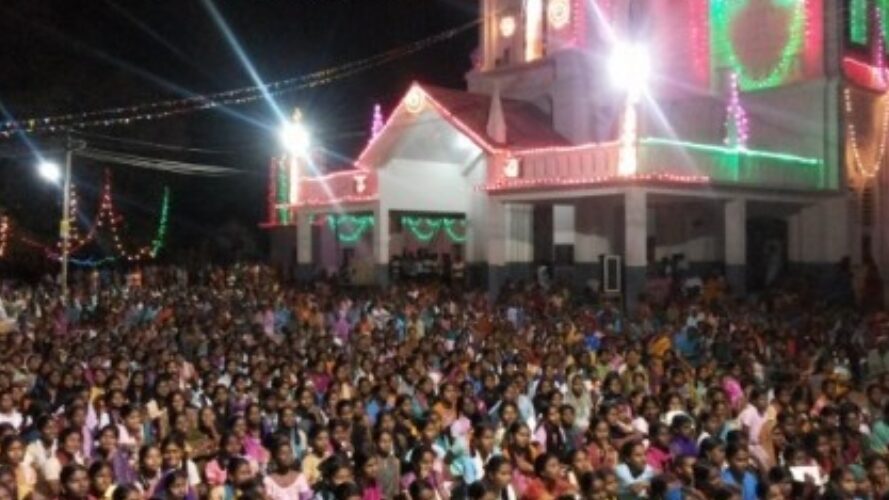Pop-Up Play in India Raises Awareness About Slavery to Tens of Thousands
Slavery
The beat of the parai drum fills the humid air in a small South Indian village. The sun is setting, and a crowd of curious people gathers to watch a lively play.
One of the actors named Upendra cowers as another performer approaches him with a raised stick, poised to strike. Upendra is playing the role of a man trapped in a brick factory as a forced labor slave. The audience is captivated by the compelling performance, and many breathe audible sighs of relief when, finally, the family is set free.
Upendra is traveling the state to perform this play and raise awareness about modern-day slavery; he is also sharing part of his own story. Before he was an actor, Upendra was a slave.
For 15 years, Upendra did back-breaking manual labor in a brick factory, trapped and never allowed to leave. Perhaps most hard to comprehend is the fact that Upendra never sought help—he simply did not realize he was a victim in an illegal system of forced labor slavery. He explains: “As a citizen of India, I actually was living in bondage and did not know what freedom was. Now, I understand what freedom is and what rights look like.”
Why Street Theater?
Upendra’s story is not unique.
There are an estimated 10.7 – 12.7 million people trapped in forced labor slavery throughout India. Traffickers typically prey on uneducated and impoverished people.
IJM Chennai is raising awareness about slavery in all 32 districts in the state of Tamil Nadu through this 20-minute play, performed by Upendra and the Mugavari Cultural Troupe. Street theater is a common strategy for advocacy in India, especially in places where many people are illiterate.
In just three weeks, nearly 14,000 people have learned about the reality and brutality of forced labor slavery.
A Shocking Story That Is All Too Familiar
The play is based on the true story of a man named Vinod.* IJM helped rescue Vinod three years ago; he had been trapped as a slave for 15 years. He endured much violence, but his greatest suffering was the death of his child. Soon after Vinod’s wife gave birth, their infant became sick. The owner refused to let the couple go to the hospital, and the baby died. On that very day, the owner made the couple return to work.
As shocking as this story is, many of the people in the audiences relate to it. After the troupe performed this play in one village, a middle-aged woman came up to one of the IJM staff members with tears in her eyes and said, “You’ve depicted my life through this play.”
Hephzibah Sunder, IJM Chennai Director of System Reform, says, “As we travel, we see how persistent the problem is. So many people we’ve met have already lost years of their lives as slaves or have relatives trapped right now.”
Hundreds Join the Movement
The actors and IJM staff will be traveling until the end of the month, spreading the message of freedom far and wide. Loyola College—one of India’s top universities—is lending its expertise to help facilitate the ambitious 40-day campaign.
The governor of Tamil Nadu, Dr. K. Rosaiah, spoke at the kick-off event at Loyola College in Chennai on August 21, 2014. He reminded the crowd of around 1,000 people that everyone has a role to play to end slavery: “People from across the State must work together—students and academic institutions, NGOs, government officials, police officers, the media, members of the vulnerable community—we should converge to uniformly raise a voice against this crime.”
“The more we name this crime of bonded labor and get society at all levels impassioned, the more quickly we are going to eradicate this form of slavery,” says Hephzibah Sunder, adding, “The number of empowered people is growing, and it’s just a matter of time before the traffickers and slave owners have to shrink back into the shadows.”
Read more about the impact of this creative campaign in one of India’s leading newspapers, The Hindu.
Setting The Stage: How The Traveling Play Works As IJM Chennai travels with the street theater group around the state, the pop-up play is being performed for audiences ranging from a few dozen to several hundred at a time. To gather an audience in the villages, the troupe spends about 15 minutes wandering through the alleys or dirt roads beating their parai drums and singing lively songs. They end in the village’s center, often a schoolhouse or sometimes a single tree. In larger towns and cities, IJM has worked with local NGO’s and government officials to have the play performed at community centers and universities. In these settings, the audiences are empowered and challenged to keep spreading the message—to think of creative ways they can take back to their own communities to help prevent people from being tricked or trapped in this form of modern-day slavery. No matter where the play is performed, it always ends with a lively song, a familiar form of folk art for every Indian audience. The lyrics of this song are mostly numbers—it’s a ditty to help people remember an anti-slavery hotline. In just the first three weeks, numerous people have called the hotline for help and explained they got the number from a relative who saw a play about forced labor slavery. The local hotline to report suspicious cases or (bonded labor) slavery is 80560 80000. |